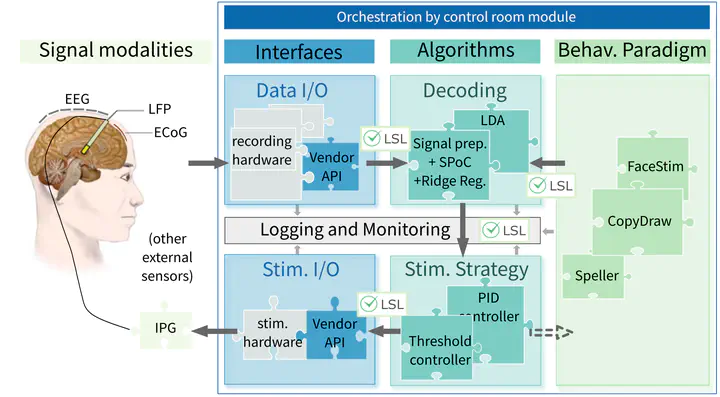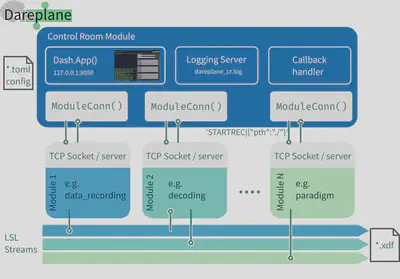Dareplane
Towards closed-loop adaptive deep brain stimulation

Data-driven Research and evaluation platform for neurotechnology
Background
Deep brain stimulation (DBS) for the treatment of, e.g., Parkinson’s disease can profit from adaptive stimulation strategies. These aim at providing electrical stimulation to basal ganglia only when required and thus may show reduced side effects and an overall lower energy input into the brain. While research on DBS hardware capable to record from and stimulate via implanted DBS electrodes is picking up pace and has given rise to a number of new companies, the data-driven modules required for a closed-loop DBS system are lacking behind. The Dareplane project aims at providing modules for both, the decoding of informative neural markers, which shall inform the system about the stimulation need, and the control of the stimulation parameters. Dareplane will combine these modules with hardware for stimulation and recording and with modules for user tasks into a flexible open-source platform, which shall support fundamental research on the necessary modules.
Details about the Dareplane platform
Creating a closed-loop deep brain stimulation (DBS) setup is a complex task. It requires multiple hardware components to communicate in sync. Testing such a setup is particularly difficult as a real world test is only possible with a patient in the loop. Yet many of the tasks which are addressed in a closed-loop DBS setup are rather generic, such as synchronous data recording or certain preprocessing steps during decoding. We therefore aim to provid a robust platform for the community to develop closed-loop DBS setups, starting from modular building blocks. Within the Dareplane project, the platform will be tested with motor- and cognitive tasks on patients with Parkinson’s disease. Dareplane is funded by the Hersenstichting (Dutch Brain Foundation) and executed in collaboration with the University Medical Center Maastricht (UMCM+), receiving feedback from patient investigators of the Dutch Parkinson’s Disease Association.
Our key design considerations:
- Modularity: Modules are categorized into classes “Interfaces”, “Algorithms” and “Paradigms”. The interfaces contain modules for recording data from various vendor APIs into the LSL framework, as well as modules for controlling the stimulation parameters. The algorithms class contains modules for decoding neural and other signals as well as control modules using the decoders output. Finally, there is the paradigms class, which will provide motor and cognitive paradigms. All modules should be replaceable by a module of the same type, in order to enable simple what-if analysis.
- Open Source: The code for the platform and its modules will be made open source for the community to leverage and extend on their specific needs basis.
- LSL: The labstreaminglayer project is a great way of providing shared data streams and synchronisation. Thus, the LSL framework will be implemented as integral part for communication between modules.
- Stimulation IO: There already exist elaborate platforms for the development of BCIs (e.g. medusabci.com), however they are not design with the aim to provide direct stimulation via additional hardware, like it would be necessary for a closed-loop DBS setup. We will provide first modules for integrating vendor APIs and stimulation parameters to finally close the loop for DBS.
Implementation details
Dareplane provides independent modules which can be orchestrated by a central control-room module. A full setup is then composed by using a simple configuration file, pointing to the modules paths. Similarly, functionality of multiple modules can be connected to macros for e.g., starting up the recording on multiple different recording devices. For more details, please be referred to the methods section of the Dareplane paper preprint.

Interested in the project? Reach out to us with comments or requests. We are happy to discuss ways in which we can make this a useful platform for all of the community.
Current Milestones Reached
2022-12-06 - first experiment with platform prototype
2023-01-20 - first DBS (open loop) experiment controlled by the platform prototype
2023-06-09 - Released Dareplane on github
2024-06-31 - Preprint available on arxiv